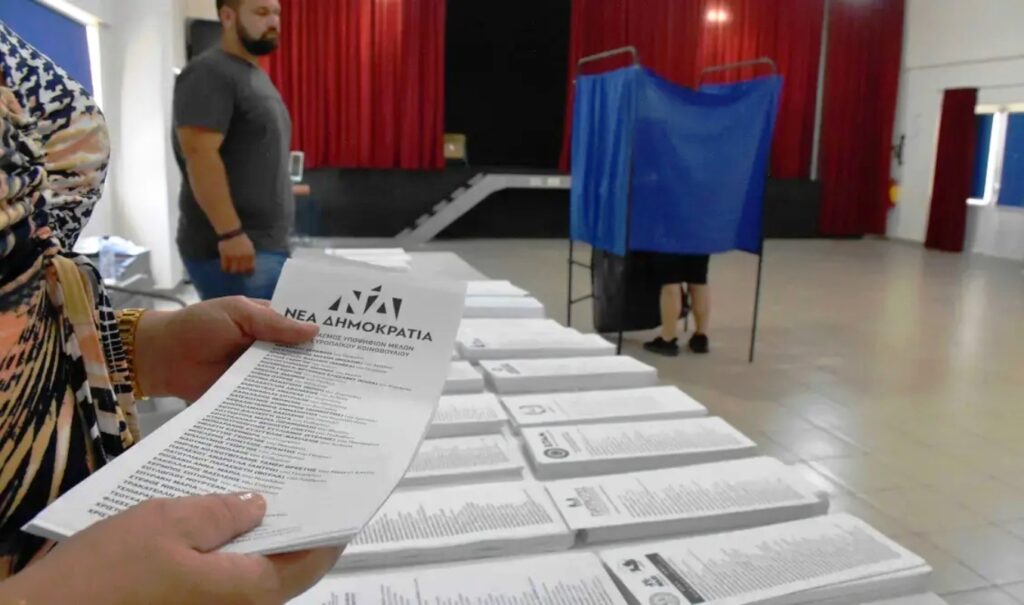New Democracy remains steadily ahead, despite polling losses, according to the Interview poll for POLITIC. The “blue faction” leads in electoral result estimates with a double-digit percentage over second-place PASOK (25.9% versus 14.8%), which appears unable to capitalize on the governing party’s decline. Meanwhile, the undecided voter rate stands at 17.4%, indicating uncertainty in the political landscape.
Specifically regarding voting intentions, compared to the June measurement:
-New Democracy retreated from 25.9% in June to 21.4% in August.
-PASOK – Movement for Change remains second, virtually unchanged, from 12% to 12.2%, showing no signs of substantial expansion.
-Greek Solution strengthened marginally, from 7% to 8.4%, capturing third place.
-Course of Freedom moved at nearly the same levels, from 8.5% to 8.3%.
-KKE remains stable at 6.5%.
-SYRIZA recorded gains, from 2.9% to 3.7%, without overturning the shrinkage trend.
Voice of Reason reached 4.4% (from 3.5%), MeRA25 hit 4.3% (from 3.5%), Democratic Movement reached 4.1% (from 4%). VICTORY was limited to 1.1% (from 2%) and New Left remained stable at 1.7%.
Notable is the increase in undecided voters, rising from the already high 16.7% in June to 17.4% in August, reinforcing the image of political skepticism among the electorate.



Interview poll: Mitsotakis most suitable PM, Tsipras measurement results
Of particular interest is the question about who is considered most suitable for prime minister between Kyriakos Mitsotakis and Alexis Tsipras. Mitsotakis gathers 31%, Tsipras is within breathing distance at 26%, while the “Neither” response collects 43%. Tsipras remains at the same levels he recorded in polls before the last national elections, with the image differentiation mainly due to Mitsotakis’s decline rather than his own rise.
On the question “which political leader do you trust most for governing the country,” August data shows significant changes compared to June. Kyriakos Mitsotakis retreated noticeably, from 31.7% to 26.5%, losing five points in two months. Simultaneously, the “none” response strengthened from 29.4% to 30.9%, claiming first place. Nikos Androulakis remained nearly stable (10% in June, 9.3% in August), while Zoe Konstantopoulou moved at the same levels (7.3% – 7.4%). Other leaders recorded small shifts without creating any reversal trends.


Interview poll: Nearly one in two SYRIZA voters wants alliance with Tsipras
Of particular interest is the question about what SYRIZA should do if Alexis Tsipras proceeds to establish a new party. The data shows balance: 30% believe SYRIZA should continue its autonomous course, while another 30% favor merger with the new political entity. Significant remains the percentage of those not taking a position (28%), reflecting uncertainty within the center-left.
Notable, however, is the finding among SYRIZA voters themselves: nearly one in two (48%) would prefer alliance with Tsipras, indicating the former prime minister’s strong personal influence on the party audience. Conversely, PASOK voters at 39% favor an autonomous course, estimating that a merger with a new Tsipras party would likely not benefit them politically or electorally.


Greeks demand tax relief, not subsidies
When asked which measure they consider most important for the country’s economic policy over the next two years, citizens respond categorically: 57% demand tax reduction. Conversely, only 16% consider strengthening social benefits and pensions a priority, while 18% choose structural reforms for investment and competitiveness.
The picture is confirmed in the specific question about the new package of measures the prime minister is expected to announce at the Thessaloniki International Fair: 41% favor tax relief for incomes of 20,000–40,000 euros, with other options gathering significantly lower percentages.


Public opinion on this year’s wildfire management
According to the measurement, 48% of citizens consider this year’s wildfire management worse compared to previous years, while 34% estimate it remained at approximately the same level. Only 17% judge the management was better.
The picture differs significantly based on party preference. 62% of New Democracy voters state that wildfire response was better than other years, while 61% of other party voters and undecided consider it worse.


Of particular interest is the question about citizens’ attitudes toward evacuation or protection notifications via the 112 number. Society appears divided: 50% believe citizens should judge for themselves, assessing the situation’s severity, while 46% respond that instructions should always be followed absolutely.
Analysis by electoral base reveals sharp differentiations. 88% of New Democracy voters support full compliance with 112 instructions, while 61% of other parties and undecided favor personal judgment.







